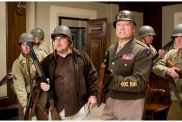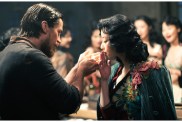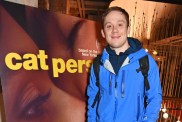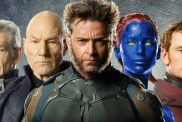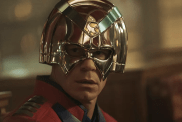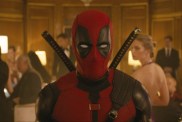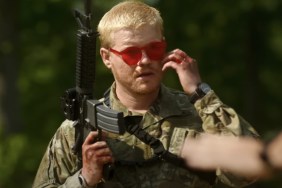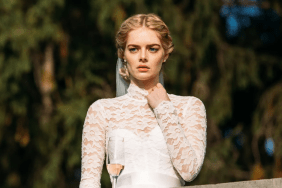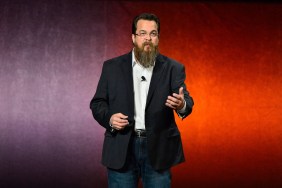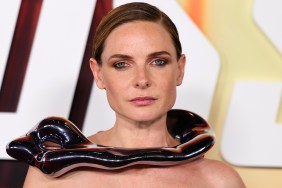
John Krasinski chats with CS about his second film as a director, the family drama The Hollars
Now playing in select theaters, the ensemble family drama The Hollars represents the second feature film from director John Krasinski. Krasinski, who many first came know from his starring role on NBC‘s The Office, made his directing debut with a 2009 adaptation of the late David Foster Wallace’s fiction anthology Brief Interviews with Hideous Men. Now he’s back behind the camera with a very different cinematic work. One that, as he explains in the below interview with ComingSoon.net, comes from a very personal place.
Boasting a cast that includes Emmy Award winner Margo Martindale, Academy Award nominee Richard Jenkins, Sharlto Copley, Academy Award nominee Anna Kendrick, Charlie Day, Josh Groban, Mary Elizabeth Winstead, and Randall Park (in addition to Krasinski himself), The Hollars follows John Hollar (Krasinski), a thirty-something at the crossroads of a great many life changes and unsure how to feel about any of them. Returning to his hometown to visit his family, John becomes swept up in a sea of personal drama that, as is often the case with families, is infinitely frustrating and life affirming.
ComingSoon.net: In comparing “Brief Interviews with Hideous Men” to “The Hollars,” the former feels very much like a director’s movie while the latter feels like an actor-centric film.
John Krasinski: Oh, that’s interesting and I think you’re right.
CS: Is that how it came your way? You were initially attached just to star in “The Hollars,” right?
John Krasinski: Yeah, it came my way six or seven years ago, only as an actor. Jim Strouse was going to direct it at the time. To be honest, there’s a lot of family movies out there. I had no intention of doing a family movie and I had no intention of doing anything derivative. Then I read Jim’s script and I knew I did have to do a family movie. It was so specific and so not derivative. It was such an honest, open take on family. He has the ability to do these hairpin turns between drama and comedy, which I think is where real life exists. You don’t have big music swells and then the emotional moments in your life. You don’t have these big wide pauses when you tell jokes. He understands that life sometimes just sort of happens and sometimes the same moment can be funny and tragic and happy and sad all at the same time.
CS: Once you came aboard as director, did you change anything in the script to make it more specifically about your own family?
John Krasinski: Yeah, I rewrote a little bit of it. With Jim’s blessing, thank goodness. There were a couple of things. Margo’s speech about the chandelier, for instance, I wrote that. It was a story that my dad actually told me in a moment where I felt like I was going through the same thing as the character. I was lost and probably felt a little bit like I was — not a failure, but a black sheep. Because, with this amazing education, I decided to be a professional waiter, basically. I was waiting tables before I was an actor. My dad told me a story about how, when he was at Catholic University, he went and would play basketball and then he’d just look up at the Library of Congress before he went to study. I thought that was so amazing because what he was saying was, “Your creative endeavor is so exciting and thrilling to me because I had these small, minor moments and you get to live in that world.” He said, “I’m so proud to have a son who would pick a path littered with ’no’s on either side and still decide to walk down it.” It was huge. There was a lot of personal stuff for me in this movie. Not to mention having a child. My daughter was four-and-a-half months old before we started shooting. It changed everything about how I saw the movie. Yes, I could bond to my character as a guy who was on the doorstep to having a kid, but more importantly, it connects you to family in a much heavier, sort of big way. There’s an existential connection to these people that you can’t have with anybody else. I understood my parents better. I understood my brothers better. I understood the idea of coming from a family name. A big conversation about lineage, I hadn’t had with myself. I knew where my grandparents are from, but you understand that you’re really connected in a way. It was big. I was working a lot of stuff out in this movie.

CS: This is such an impressive line-up of talent. Where does a cast like this start coming together?
John Krasinski: It was some people I had worked with. Some people I just knew. The most important thing for me was to get the mother part right. She’s the centerpiece of the movie and therefore the centerpiece of the cast. My first call was to Margo Martingale. To be fully honest, if I hadn’t gotten Margo, I’m not sure I would have directed the movie. She’s so perfect for it. She’s so specifically singular as an actress. If you want to cast a movie, get someone like Margo and watch how fast other people jump on. Richard Jenkins wrote me an e-mail that said, “I like the script. Get Margo Martingale and I’ll do it.” I wrote back, “Ha ha ha” and he wrote back, “I’m not kidding.” So as soon as I got Margo, I got Richard. Sharlto I had seen in “District 9” and just thought it was one of the best performances ever. Then I met him when I wrote “Promised Land” with Matt Damon. He was up shooting “Elysium.” I met Sharlto on that set and, instead of being this really hardcore action dude, he was really open and honest and vulnerable. That’s who I thought was perfect for Ron. Once the family came together, I just got really lucky with all the other characters. To get Charlie Day in your movie [is great]. I think every actor knew what this movie was. Usually when you offer a part, people will say, “Yeah, I’ll do it but change the ending,” or “I don’t like this one part.” On this one, every actor just got it. They came understanding why all these characters weren’t just the cliche version of these characters. They’re important colors in this giant tapestry.
CS: Do you feel a higher level of confidence coming in to direct a second feature film?
John Krasinski: Way more confidence. I weirdly had a lot of confidence on “Brief Interviews,” but now I think that was just ignorance. I think it was the “ignorance is bliss” model in that particular instance. Then I learned so much about what could have happened. We got really lucky on “Brief Interviews.” It was a very low-budget movie. This is also my first linear movie, which makes the storytelling much harder. “Brief Interviews,” while I’m so proud of it, is an arthouse film. It could be disjointed. This can’t. If you’re not laughing at a certain point, I’m not doing my job and if you’re not crying at a certain point, I’m not doing my job. We really had to structure it together. Weirdly, though, I’m more confident in the story structure. “Brief Interviews” was all in how I shot it. On this one, even shooting it is just another way to tell the story. It really all kind of came together on this one.
CS: Is there a process by which you and your castmates form that familial bond?
John Krasinski: Oh yeah. I will say, though, I have never had another experience like I had on this. This cast came together so fast and bonded together, at least the four of us. On low-budget films, you don’t get time for rehearsals. I had one day before I started shooting where we did a table read for three hours. Sharlto and I watched Richard and Margo just sit down in the chairs and they were married. While they were reading, Richard reached out and just touched her wrist gently. She laughed and looked at him. It was just unreal how good they were. Sharlto and I were really intimidated. Then I remember this story that was really funny. At one point, Sharlto was getting really antsy and he got up and said, “I’m really sorry. It’s the World Cup. It’s the finals. I’ve got to go watch the end of this game.” Richard went, “What the f—?” and just yelled out loud. Margo went, “Oh let him go. Just let him go.” We were the family. The wayward brother just leaving us, me being the good kid and staying with it and the parents arguing over how much fault was Sharto’s.
CS: Have you had the chance to show the film to your own family?
John Krasinski: I have shown it to my own family. They’ve seen it a couple times now. They love it. They felt the way that I felt when I read the script. The truth is, I hope everybody feels that way. I come from a very close, tight-knit, communicative and loving family. It’s very opposite of this family and yet, when they watched the movie, they were emotionally wrecked. They saw dynamics of family. The idea of love. I think that there’s existential pull that your family has on you that you’ll never have with anybody you ever meet. That can be good or bad, but the channels of love are always there. They can be collapsed or delinquent, but they’re always there. I think that the beauty of this movie is that it reminds you that, if you’re not so tight with your family, you always can be. A friend of mine just had her mother pass away. I remember that, as long as I’ve known her, she never really spoke with her mom. They had a falling out. Yet, just before her mom passed away, my friend was by her side. She said that she just had the most existential three days of her life because, no matter how long and how far she had pushed away her mother, it all came swelling back in that last moment. Because she was connected to her. Sure, there were regrets and all those things, but she had the most honest conversation. She got in bed with her and hugged her though the last few moments. That’s a beautiful idea and I think that this movie invites you to start heading down that path. I had a friend who told me, “I really loved this movie. If I had a better relationship with my mom, I’d call her.” I said, “Do it. That’s the best part. You can. You can start all over.”

CS: Do you have a plan in mind for how you want to balance directing and acting moving forward?
John Krasinski: It’s really about the story. “The Office” has afforded me every opportunity in my career. The luxury it has afforded me means that I can take big chances and try things that are different. In doing that, though, I try not to just choose willy-nilly. I try to choose things that are really important to me or that speak to me. “13 Hours” as an actor was a transformative moment both physically and career wise. For directing, it’s even more so. George Clooney gave me a bit of advice on directing. He said, “You’ve got to make sure you’re the guy for the job. Don’t just choose anything to direct. Don’t direct just to direct. Make sure that something impacts you so much that you’re the only person that can tell this story.” It’s true. That level of connection and inspiration with a script makes a movie as good as it can possibly be. I guess that, moving forward, it’s if I get struck by something that I think is really good — and now that I’m producing, we have a lot more stuff coming in. I don’t have to be in the stuff that I direct. I know I’ve been in both of the things that I’ve directed. That’s never been my intention, though. If something comes in and it’s great to act in, I’ll act in it. If it’s something that would be great to act in and direct, I’ll do that. But it’s something I just want to direct, I can do that, too. For example, if there was an amazing movie and it starred all 12-year-old kids, I’d want to do that. If the story is good enough, I want to be the one to direct it. I would imagine that the next thing I direct will be very different from this. Wether it’s a political thriller or anything else, I love doing new things.
CS: You’re also gearing up for the new Jack Ryan series from Amazon Studios. What brought that your way?
John Krasinski: It’s awesome. I’m so excited about it. Also, slightly terrified. But, at the end of the day, it’s something that I love. I loved the Jack Ryan character in the books and the movies. The pitch to me was that Carlton Cuse said, “The reason we’re doing this is because it’s a movie in ten parts. It’s not a TV show.” I thought, “Oh, he’s just arguing semantics.” But the truth is, we’re doing a full big-budget movie and this may be the best format to tell Jack Ryan stories in. Two hours may not be enough for these such heavily-detailed, rich books. Really, that world needs some air. Plus, Jack Ryan’s superpower is his intelligence. There’s going to be a lot more problem solving. It’s not like Batman where, once you figure out who the bad guy is, you can just have a fight scene. It’s a lot more intellectual and problem solving. That, I think is fascinating, because I’m such a huge fan of the spy genre. If you’re a fan of the spy genre, I think you’re going to like this.
CS: And it’s a ten-episode season?
John Krasinski: Yeah, it’s ten episodes and we’re going to start filming in January. We’ve hired writers and we’re talking about directors now. It’s thrilling. People have asked, “What’s it like going back to television?” I don’t really see it that way. “The Office” was at the beginning of this changing television landscape. We got picked up because of iTunes. People were buying a show that they could see for free. That was a huge signal to a network. I never saw as big a dividing line between TV and film because I started when there was already a small dividing line. Now, I’m the perfect example of a consumer. I’ll watch anything that’s interesting. Whether its a full season or an Adult Swim fifteen-minute episode. I love it all. I’m just excited to work on good stuff.
A Sony Pictures Classics release, The Hollars is now playing.
The Hollars
-
The Hollars

-
The Hollars

-
The Hollars

-
The Hollars

-
The Hollars

-
The Hollars

-
The Hollars

-
The Hollars

-
The Hollars

-
The Hollars

-
The Hollars

-
The Hollars

-
The Hollars

-
The Hollars

-
The Hollars

-
The Hollars

-
The Hollars

-
The Hollars

-
The Hollars

-
The Hollars

-
The Hollars

-
The Hollars

-
The Hollars

-
The Hollars

